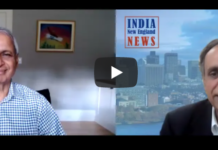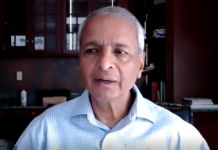By Desh Deshpande
Editor’s note: This is Part-8 of the weekly video column with philanthropist and serial entrepreneur Desh Deshpande, with excerpts from his book “On Entrepreneurship and Impact.” This column appears every Monday.)
“Fierce conversations are about moral courage, clear requests and taking actions.”–Susan Scott, Fierce Conversations

There are numerous stories of startups that started with a wonderful idea, great promise, initial traction and were soon biting the dust – not because the marketplace demand diminished – but because of conflicts between founders or key leaders in the company.
In short: There is harmony when every key player in a startup is wedded to the company mission. There is conflict when key players depart from the core mission.
Conflict happens in startups.
It happens more often than we imagine, because not all conflicts come to light.
How you handle conflicts as a leader will make a big difference as to where your startup is headed and, more importantly, how fast it’s headed in that direction.
Let’s take the extreme case where one of the key players has a change of heart for the worse (as it relates to the startup, of course). They were passionate about the idea and the mission, but something happened and they have lost interest.
What do you do?
You should have a frank and fair discussion and respectfully ask them to leave. Wish them well with their future. It is the right thing to do, both for their sake and for the sake of those that remain with the company.
This seems hard to do, but not taking this step and maintaining the status quo would be more painful.
Now, let me address a situation that is a bit more complex.
One of the founders has a different take on how things should progress. They have a strong opinion about changing the core company mission. In short, you both have a difference of opinion the size of the Grand Canyon – a difference you can’t ignore.
This is the time to have a mature, or as Susan Scott puts it – a fierce conversation.
While there is no guarantee that either of you are right or wrong, it is important for both of you to leave your ego at the door so you both can have an objective take on the issue at hand.
At the end, if you feel that the other person is right, you will be better served by accepting their assessment and making the necessary changes. You are not showcasing your weakness if you change direction. In fact, you are demonstrating strength and openness to listening to sound advice. You will deepen and extend their loyalty for a long time to come.
On the other hand, if you are right, but unable to convince the other person to see your point of view, you are back to square one. It will be better for them to leave rather than making it hard for both of you. You both want the best for the company and a radical step like this is sometimes necessary.
I remember my first venture that I co-founded. It took one year to get funded. A few months after funding, it was clear that my co-founder and I had irreconcilable differences of opinion on how we should proceed.
Long story short, I walked out of the company even though my personal situation was not that great. It was painful when I took that decision. Looking back, it was the best decision I made.
In short, facing reality is painful in the short-term. However, not facing it head on could be detrimental for you and the company in the long-term.
(About Desh Deshpande: During his entrepreneurial career spanning over three decades, Gururaj “Desh” Deshpande has built several companies. He has injected his passion for innovation and entrepreneurship into a number of social impact initiatives in India, the USA and Canada. He has been recognized for his entrepreneurial accomplishments by many institutions including being named co-chair of President Obama’s National Advisory Council on Innovation and Entrepreneurship. He currently also serves as a Life Member of the MIT corporation. He resides in Boston together with his wife, Jaishree.)












